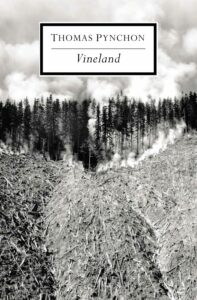Vineland

On California’s fog-hung North Coast, the enchanted redwood groves of Vineland County, a wild assortment of sixties refugees from the “Nixonian Reaction” live on. They're still struggling with the consequences of their past lives. Aging hippie freak Zoyd Wheeler is revving up for his annual act of televised insanity. The latter typically involving self-defenestration to keep government checks flowing. When news reaches that his old nemesis, sinister federal agent Brock Vond, has come storming into Vineland. And with him a heavily armed Justice Department strike force. Zoyd instantly disappears underground. But not before dispatching his teenage daughter Prairie on a dark odyssey into her secret, unspeakable past.
Page 1, Vineland
Vineland is structured in a non-linear fashion, employing flashbacks and multiple narrative threads that converge and diverge throughout the novel. Pynchon incorporates elements of satire, surrealism, and absurdity, often blurring the boundaries between reality and fantasy.
The novel explores the clash between the counterculture ideals of the 1960s and the conservative political climate of the 1980s. Pynchon examines the consequences of the societal changes that occurred in the interim, as well as the lingering effects of the Vietnam War on individuals and society as a whole.
Through its intricate narrative and diverse range of characters, Vineland offers a multi-layered exploration of themes such as nostalgia, disillusionment, and the struggle for personal and societal freedom.
It took many years for Thomas Pynchon to emerge with Vineland following his blockbuster Gravity's Rainbow. It is among my favorite of his works.